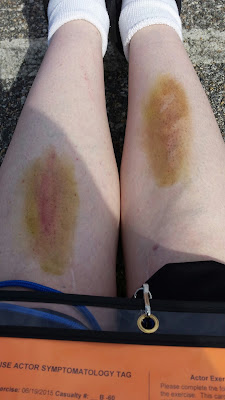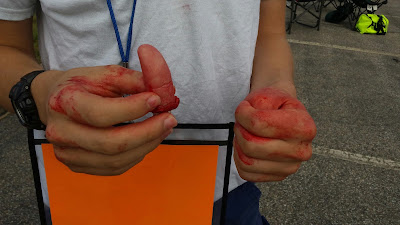| (Photo credit: Wikipedia) |
If I could pick one nugget to share from my experience, it would be that in a "situation" whatever the situation is that you've cooked up for your character, the thing on their mind will be the last related story they were told.
Example 1:
I had been out as a walker most of the day tracking the handler who was tracking the dog who was tracking the lost person. We had a "find." A young woman and her friend were hanging out in the bramble as our subject. After applying fake first aid to a fake injury, we assisted in an equine evacuation. The girl and her friend had been in the woods for hours, and I was asking how they did. The woods can be a scary place. "Were you afraid?"
"Only of bears," she said.
Huh, okay.
Fast forward, dinner's done back at base, and they're calling for volunteers to be staged in the woods. I was glad to do that, I'm quite comfortable in the woods, and I had sufficient equipment in my pack that the below freezing temperatures and chance of snow didn't feel concerning. So off I went. We drove until there was no more fire road, then I was walked waaaaay out into the woods until I hit the location they'd assigned me, and my handler left me there. The last thing the handler was talking about was bears in the woods. Since it was pitch black out there, I asked if I was allowed red lights (we don't use white lights in the woods if we're not using a search beam, because we're trying to keep our night vision. I use a green light when I'm walking in the woods at night, because it's easier to read a topographical map.)
"Why do you want lights? Are you feeling scared?"
"No not really, it's just that you've been talking about black bears; and when the K-9 runs out of the brush, I'd like to know it's a dog and not a bear. I'd like to know if I'm about to get licked or mauled."
"Good point, but no. We'd prefer you not use your lights."
So there I was. Alone. Wrapped in a black tarp. Sitting under a tree, contemplating life. And the rustling sounds around me. And was that a snort?
As I said before, I'm perfectly okay in the woods, night or day. What sent me out of my comfort zone was that a potential threat loomed in the forefront of my thoughts, since it had been alluded to twice that day in the context of sitting alone in the woods.
Those earlier conversations are what made me pull my knife out of its sheath and stab it into the dirt beside me. I kept my hand on the handle. A low level hum of "what if," ran the entire time I was waiting for my "rescue."
Example 2:
Fast forward; The K-9 team found me as the moisture in the air started to rise and the dew began to form. The temperatures were dropping precipitously. I headed to the equine camping area to warm up in front of the campfire before Hubby and I drove to our tent to get some sleep. Around the blaze, we were sharing war stories of past searches. One of the last stories they told was that the night before, only one equine searcher was in the area. It was a single woman in her horse camper. She was the only one who was supposed to be there. Late in the evening, she heard two men talking outside. She listened as they circled around her trailer.
The woman called over to base and several men came over and did a search. Finding no one, they went on their way. The strangers came back and tried the woman's door handle. She racked the slide on her semi-automatic and called out, "Leave now or I shoot." They high tailed it out of there.
It was an odd story because no one should have been testing her door's locks. It was also concerning because no one was supposed to be in the area, not even park staff. To be honest, there aren't many who want to hang out on the top of a mountain, camping in December.
I heard the story and promptly forgot the story. That is, I forgot it until Hubby and I were in our tent. We were the only tent in the whole campground and the campground was a good distance from the equine area and even farther from base. No big deal, Hubby and I are perfectly comfortable in the woods. Though, a little warmer would have been more pleasant as far as our comfort went, that's for sure.
As we lay in our tent, a dually truck drove around the camp twice, nice and slow.
Here's what I was thinking:
I'm in silk long johns in my sleeping bag. My boots are a hassle to get on. No one would hear me if I screamed. My pack is in the car. I have no gun. I didn't even bring in my knives. It's around twenty degrees outside. There's nowhere to run except deeper into the woods. Dressed the way I am, there isn't a good chance of survival if I run towards the woods. My best option, if these men come to cause problems, was to get past them, out the small tent door, down to the bathhouse and lock myself in the shower room. Of course, I'd be barefooted and in almost no clothes, so unless they left pretty quickly or there was a ton of hot water available, I'd probably freeze.
I'll be honest, the bears were such a long shot in terms of actually being a problem, that it was just something that played through my brain. The story about the men - who tried to enter our teammate's trailer and had to be chased off with the threat of gun fire - that was much more worrisome. Worrisome enough that I only slept lightly, keeping an awareness of the sounds, trying to catch footfalls coming toward the tent.
The next morning, I was talking about it with Hubby. Of course, he was in the same straights I was -- clothing and weapons wise. He'd heard the same story and the concern of folks not on the mission being in an area that was supposed to be empty. He went through almost the same thought processes as I did.
"So what did you conclude? Did you have a plan?" I asked.
"I guess it would come down to who won the fight us or them."
So he had imagined how he'd have to spring from the sleeping bag (and we had to stay zipped against the cold). His conclusion, we didn't have a good shot at coming out of this okay. He hadn't considered getting to the showers but said that would have been a good route.
We both decided that we'd make better weapons choices next time around. Live and learn and come out the otherside. It's all an adventure.
On the drive home, I thought about the significance of that last story one hears, the last odd concern that was expressed. It has the power to construct a new understanding of an otherwise okay situations. The storytelling becomes a warning that looms large when in a situation where the other person's story elements are lining up with yours. It's a great way to get to know a character or twist a plot.
I thought this was a pretty good thing to keep in mind as characters are sharing their stories with the others in a book. So I'm sharing my observation with you in case you're wondering just what your character would be thinking.
Cheers!
~And happy writing.
Fiona
























